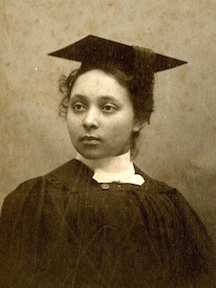By Kathryn James
Mary Annette Anderson, born to a French Canadian and Native-American mother and African-American father in 1874, was the first African-American woman to enroll at Middlebury College in Vermont. At Middlebury, Anderson is remembered as a “trailblazer, a remarkable woman,” whose collegiate experience was not defined, or confined, by her race. Graduating in 1899 as valedictorian of her class, she was the first African-American woman to be elected to Phi Beta Kappa.
Her academic success continued after graduation, as Anderson pursued a career in higher education. She briefly taught at Straight College in New Orleans, Louisiana (since merged with Dillard University), before moving to Washington, DC, in 1900. In Washington, Anderson taught English, history, and rhetoric at Howard University, where she remained until her retirement upon marriage in 1907. Anderson and her husband, Walter Lucius Smith, ultimately returned to Vermont, where he finished postgraduate work.
The extent to which Anderson was able to exercise her academic prowess— from being the first African-American to attend Middlebury to being the first woman to address the Corporation Dinner, a celebrated Middlebury event — shows her unique and groundbreaking positioning as an African-American woman in Vermont. Vermont’s racially progressive history, cemented as the first state to ban slavery, made it a place of relative opportunity for former slaves like Anderson’s father. This progressive spirit is also found in Vermont’s institutions of higher learning. Middlebury College, where Anderson attended, awarded the first college degree to an African-American student, Alexander Twilight, in 1823. Vermont’s Phi Beta Kappa chapters have a legacy of expanding the ranks of membership: the University of Vermont was the first to induct women, in 1875, and the second to induct African-Americans, in 1877, and Middlebury was the first to induct an African-American female — Anderson — in 1899.
Though her race did not limit her undergraduate achievements, it was clearly a factor in her professional life, as she taught exclusively at historically black colleges and universities. Further, it may have been a factor in her relatively uncelebrated legacy: Jessie Redmond Fauset (Cornell University, 1905) was cited as the first female African-American member of Phi Beta Kappa from the time of her induction until 2004. In 2003, Journal of Blacks in Higher Education combed the records of prominent colleges, researching the first African-American students to graduate from these institutions. It was during this process that the researchers found Mary Annette Anderson in the records of Middlebury College, and discovered that she was elected to Phi Beta Kappa while attending — making Anderson, not Faust, the first African-American female member.
Phi Beta Kappa does not record the racial or ethnic status of its members, so identifying, recognizing, and celebrating scholars who broke boundaries through their membership relies on the records of chapter schools regarding race. Though publications such as the Negro Yearbook noted the election of African-Americans to Phi Beta Kappa, Anderson’s election received no such contemporary publication, for reasons unknown. This likely contributed both to her relative obscurity in history and the seemingly accidental mode of unearthing her trailblazer status.
Kathryn James is a senior at the University of Mississippi where she is studying public policy leadership, Southern studies, and economics. The University of Mississippi is home to the Beta of Mississippi Chapter of Phi Beta Kappa.




